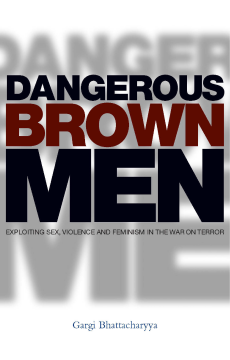
Additional Information
Book Details
Abstract
Why is the public presentation of the war on terror suffused with sexualised racism?
What does this tell us about ideas of gender, sexuality, religious and political identity and the role of the state in the Western powers?
Can we diffuse inter-ethnic conflicts and change the way the West pursues its security agenda by understanding the role of sexualised racism in the war on terror?
In asking such questions, Gargi Bhattacharyya considers how the concepts of imperialism, feminism, terror and security can be applied, in order to build on the influential debates about the sexualised character of colonialism. She examines the way in which western imperial violence has been associated with the rhetoric of rights and democracy - a project of bombing for freedom that has called into question the validity of western conceptions of democracy, rights and feminism.
Such rhetoric has given rise to actions that go beyond simply protecting western interests or securing access to scarce resources and appear to be beyond instrumental reason. The articulations of racism that appear with the war on terror are animated by fears and sexual fantasies inexplicable by rational interest alone. There can be no resolution to this seemingly endless conflict without understanding the highly sexualised racism that animates it. Such an understanding threatens to pierce the heart of imperial relations, revealing their intense contradictions and uncovering attempts to normalise violent expropriation.
Gargi Bhattacharyya lives and works in Birmingham. She teaches and researches issues of 'race' and racisms, sexuality and globalisation. Her books include Tales of Dark-skinned Women (1998); Race and Power with John Gabriel and Stephen Small (2001); Sexuality and Society (2002); Traffick, the illicit movement of people and things (2005).
'This is a thought provoking book. It challenges common assumptions about the global social and political environment we face, both in the west and at a global level. In doing so it gives voice to a critical perspective that needs to be heard and critically discussed.'
John Solomos, City University London
'This is an important and nuanced discussion of the `war on terror' as a cultural project which deploys sexualized racisms as its method. We are asked to stand against the rhetoric of transnational security and instead build alternative global publics to reject the `open secrets' that make us unwilling actors in this horrific war.'
Zillah Eisenstein
Table of Contents
| Section Title | Page | Action | Price |
|---|---|---|---|
| Contents | v | ||
| Acknowledgements | vi | ||
| Introduction: Dangerous Brown Men? | 1 | ||
| Feminism and the war | 4 | ||
| Sexuality, affect and clashing values | 9 | ||
| Multiculturalism and backlash | 10 | ||
| Dangerous brown men – is the War on Terror really about sex? | 12 | ||
| 1 The Misuse of Feminism in Foreign Policy | 18 | ||
| Rhetorics of feminism and the War on Terror | 20 | ||
| The War on Terror as yet another ethnic war | 23 | ||
| Feminist thinking and transnational understanding | 25 | ||
| Feminism via the academy | 27 | ||
| Transnational feminism and rethinking alliances again | 29 | ||
| Feminism, multiculturalism and the limits of sovereignty | 33 | ||
| What is this War on Terror feminism? | 39 | ||
| 2 Bodies, Fears and Rights | 46 | ||
| Consumption, sexualisation and the emancipated western(ised) woman | 49 | ||
| Mothering, reproduction and terror | 51 | ||
| The extremist mother | 52 | ||
| Suicide bombing | 54 | ||
| Radicalisation | 57 | ||
| Guantánamo — the spectacle of the open secret | 58 | ||
| Visualisation and embodiment | 60 | ||
| Human rights and military intervention | 63 | ||
| Embodying danger and masculinity | 66 | ||
| Embodying dangerous men | 71 | ||
| 3 State Racism and Muslim Men as a Racialised Threat | 74 | ||
| The War on Terror and state racisms | 75 | ||
| Not the first time | 76 | ||
| Establishing the category of the less-than-human | 78 | ||
| Why ‘militarisation’? | 82 | ||
| Sexualised racism and religious unreason | 85 | ||
| Bodies and beliefs | 90 | ||
| The War on Terror and everyday life in the West | 92 | ||
| The backlash against multiculturalism and imagining terrorist threats | 96 | ||
| Dangerous brown men on our streets | 97 | ||
| 4 Sexuality in Torture | 105 | ||
| Sexualised racism and the legitimisation of torture and abuse | 106 | ||
| Is the War on Terror a racist war? | 107 | ||
| Spectacularisation as a form of abuse | 109 | ||
| Sexualised racism as a strategy of dehumanisation | 112 | ||
| Pictures of abuse | 114 | ||
| When torture is not a secret | 117 | ||
| Why pictures? | 119 | ||
| Narratives of suffering | 124 | ||
| Terror as secret vice | 130 | ||
| Terror as pleasure | 131 | ||
| Conclusion: The Spectacle of Violence | 134 | ||
| Sexual propriety and civilisational battles | 135 | ||
| The global public and offers that cannot be refused | 136 | ||
| References | 145 | ||
| Index | 165 |
